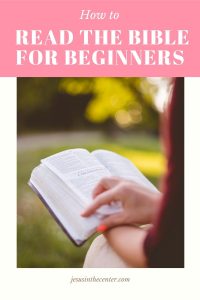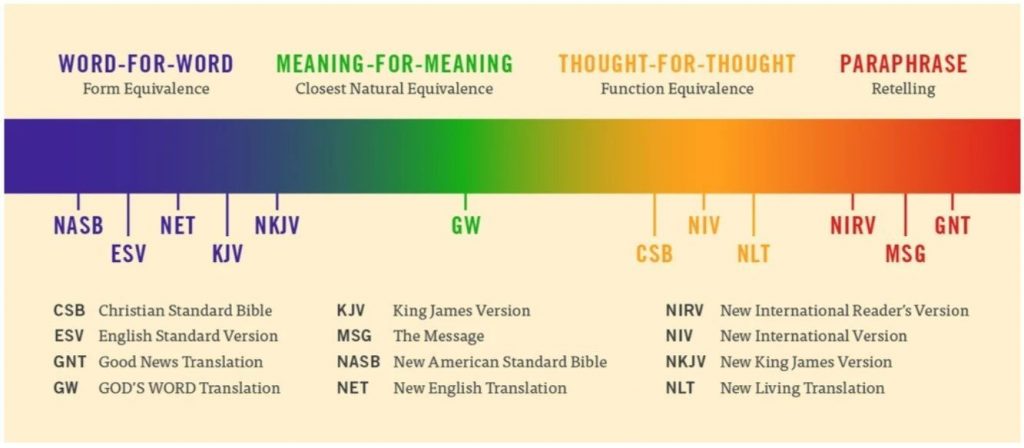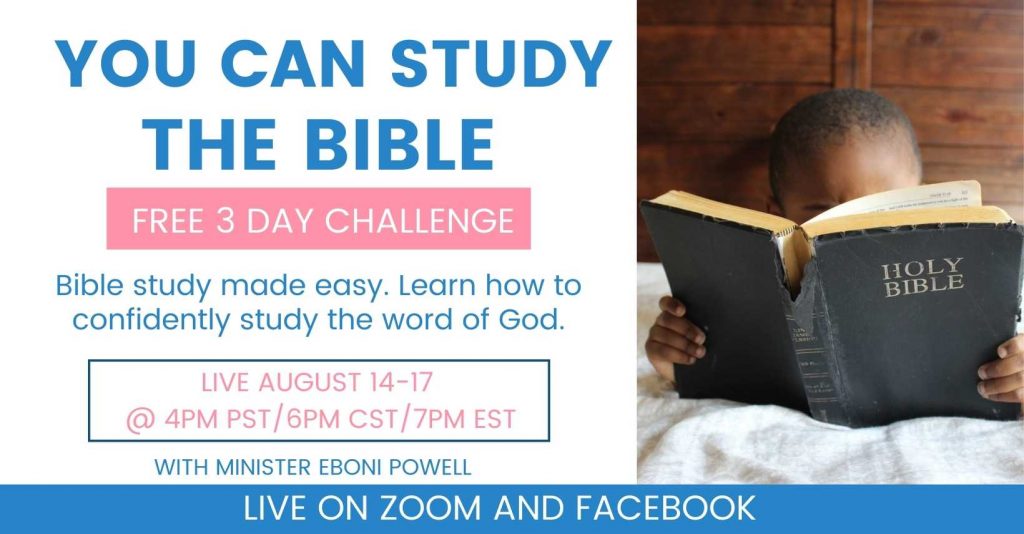Reading the Bible on your own can be intimidating. Where do you even start?
Reading the Bible on your own can be intimidating. Where does one even begin?
Do you start at the beginning and read straight through to the end? Should you jump around and read whatever strikes your fancy?
Is there a version of the Bible that’s better than another version?
Speaking of versions, how many versions are there, and what is the difference?
But reading and studying the Bible is an important part of every believer’s life and is one of the core spiritual disciplines.
Today I’ll address the most common questions that beginners have about the Bible and how to read it.
What is the Bible?

Before we discuss how to read the Bible, let’s spend a few seconds talking about what the Bible is and why you need to read it.
The Bible is a collection of literary works, written by 40 different authors, over 1,500 years.
It consists of 66 books that are divided into the Old Testament and the New Testament.
The Old Testament is made up of 39 books and spans from Genesis to Malachi. The New Testament has 27 books and spans from Matthew to Revelation.
The Bible consists of books of history, poetry, written letters, prophecy, and testimony (gospels) about Jesus.
This collection of works makes up the Bible.
It reveals the Biblical story of the world from its creation, fall, God’s plan for our redemption, and God’s plan for the future.
Why should you read the Bible?
Did you know there are roughly 1,189 chapters in the Bible?
That’s a lot of reading. Why would anybody want to read that much?
Well, first you have to understand what Christians believe about the Bible.
What Do Christians Believe About the Bible?
Christians believe that the Bible is the written word of God. That God inspired and directed each author to write each book contained within it.
The Bible is the ultimate authority on how Christians should conduct themselves and live their lives as followers of Christ.
Why Christians Need to Read the Bible
In the ’90s, there was a popular acronym for the BIBLE, which stood for Basic Instructions Before Leaving Earth.
And that’s what the Bible is. It’s our roadmap to how we’re supposed to live life on this earth as a representative of God and his son Jesus Christ.
The Bible has information on:
In short, the Bible is our instruction manual for how we should live in the world, filtered through the eyes of Christ.
- The nature and character of God.
- The history of our faith.
- Who Jesus is and why he died for our sins.
- How we should interact with God and other people.
- Proper conduct and behavior for Christians.
The Apostel Pauls sums it up perfectly in his letter to Timothy, “All Scripture is God-breathed and is useful for teaching, rebuking, correcting and training in righteousness, so that the servant of God may be thoroughly equipped for every good work.” (2 Timothy 3:16-17, NIV).
Now that we’ve covered what the Bible is and why it’s important to read it, let’s talk about the best way to read the Bible.
The Bible is our instruction manual for how we should live in the world, filtered through the eyes of Christ.
Tweet
How to Read The Bible For Beginners?

Where should you start reading the Bible? The beginning? The Middle? The End?
Just flip it open and start reading where ever it lands.
Before we look at where you should start, we need to make sure you have the right bible.
What is the Best Bible for Beginners?
Most people are familiar with the King James Version of the Bible, which also is the first authorized English translation of the bible.
However, I wouldn’t recommend it for beginners.
When choosing a bible you should consider these two things:
- Readability & Understanding
- Accuracy
Which Version of the Bible Should You Choose?
There are roughly 450 English translations of the bible.
The most popular translations are:
- King James Version (KJV)
- New International Version (NIV)
- New Revised Standard Version (NRSV)
- New American Bible (NAB)
- The Living Bible (TLB)
Why Are There So Many Bible Translations and Which One Is Best?
The Bible was originally written in Hebrew/Aramaic (Old Testament) and Greek (New Testament).
Since the original Bible was written in several languages, it had to be translated into English. The English bible versions that we read are all translations from these original texts.
However, there are several ways that Bibles can be translated.
The most accurate way is a word-for-word translation (formal equivalence).
The King James Bible (KJV) and the English Standard Version (ESV) are examples of formal equivalence. While these versions are accurate, they are harder to read and understand.
Then you have retelling or paraphrasing the scripture (dynamic equivalence) which attempts to paraphrase the original text in a way that is easier for modern readers to read and understand.
The New Internation Readers Version (NIRV) and the Good News Translation (GNT) are examples of dynamic equivalence.
There is a happy medium between the two called functional equivalence that balances word-for-word and paraphrasing. The New International Version (NIV) and the Christian Standard Bible (CSB) are translated this way.
The Bible comparison chart below shows how readability and understanding decrease or increase based on each type of translation.

You want to select a bible that is easy for you to read and understand without sacrificing the accuracy of the scriptures.
Best Bible Recommendations for Beginners
There are bible translations that I recommend for beginners based on their accuracy level. I’ve also included a sample of the same scripture from each translation.
Word-for-Word Translation
English Standard Version (ESV)
But to all who did receive him, who believed in his name, he gave the right to become children of God,
New English Translation (NET)
But to all who have received him–those who believe in his name–he has given the right to become God’s children John 1:12
New King James Version (NKJV)
But as many as received Him, to them He gave the right to become children of God, to those who believe in His name: John 1:12
Dynamic Equivalence (Paraphrase)
Some, however, did receive him and believed in him; so he gave them the right to become God’s children. John 1:12
Functional Equivalence (Thought for Thought)
God’s Word Translation (GWT)
However, he gave the right to become God’s children to everyone who believed in him. John 1:12
Christian Standard Bible (CSB)
But to all who did receive him, he gave them the right to be children of God, to those who believe in his name, John 1:12
New International Version (NIV)
Yet to all who did receive him, to those who believed in his name, he gave the right to become children of God– John 1:12

Where To Start Reading The Bible for Beginners
New Christians or people seeking to learn more about Christianity should start in the New Testament.
The New Testament covers the life of Jesus, the history of the early church, and ethical and moral guidelines for Christians.
To get an excellent overview of this information, I recommend the following reading order:
The Gospel of John– Having a firm understanding of who Jesus is and why he came is important to your faith as a Christian. The book of John does a marvelous job of explaining who Jesus is and what his ministry is about. The other Gospels (Matthew, Mark, and Luke) detail Jesus’ ministry, but they focus more on the things Jesus did.
Acts- The book of Acts was written by Luke, who also wrote the Gospel Luke, and records the history of the early church. Starting with Jesus’ ascension and commission of the disciples, the persecution of the early church, and the spread of the Gospel throughout the known world.
Romans- Every Christian should read the book of Romans. If you want to build your faith and gain a clearer understanding of the Good News of Jesus Christ, this is the best place to start once you’ve read the two books.
Once you’ve read through these first three books you should have a firm understanding of who Jesus is, the history of the early church, and a better understanding of the Good News of Jesus Christ.
After you’ve read these books, you can dive into the Old Testament and read:
Psalms– If you’re struggling with stress and anxiety, then the book of Psalms is the perfect place to start reading. There are many scriptures of hope and healing in the Psalms. They let us know that God is with us no matter the circumstances.
Proverbs– Proverbs is a book of wisdom poetry. It offers biblical advice on day-to-day life and experiences.
Genesis– If you want to start reading the bible chronologically, then Genesis would be the place to start. Genesis tells the story of the creation of the world, the fall of man, the call of Abraham, and the start of the nation of Israel.
How Often Should You Read the Bible?
Keep this Book of the Law always on your lips; meditate on it day and night, so that you may be careful to do everything written in it. Then you will be prosperous and successful. (Joshua 1:8)
In Joshua 1:8 God tells Joshua to meditate on the Law (God’s word) day and night. This will help Joshua obey God’s commands.
While reading and meditating on God’s word are two different spiritual disciplines, it is hard to do one without the other.
As a Christian, you should be reading your Bible daily.
How Much of the Bible Should You Read a Day?
There really isn’t a right or wrong answer to this question. It really depends on what your goals are.
Do you want to read through the Bible in a year?
Do you want to read it in chronological order?
Are you trying to make reading the bible a daily habit?
Are you studying a specific topic?
Is there a specific book of the Bible you want to focus on?
No matter what your goals are there are plenty of Bible reading plans available online for you to choose from. Most Bibles have a yearly reading plan already in them.
If you don’t want to follow a reading plan, I would suggest you read a chapter a day.
How to Read and Understand the Bible
Reading the Bible on your own is a great start to growing in your walk with Christ.
However, if you want to understand the Bible, you have to learn how to study the Bible.
Attending your local church’s weekly bible study is a great place to start.
Bible studies are less formal than Sunday service. Usually, you can ask the Pastor or group leader questions and gain insight from other members of the congregation.
There are also ways to study the Bible on your own, but that’s a topic for another day.
I hope answered all of your questions about the Bible and how to read it.
Don’t forget to download a copy of my Bible Reading Plan for Beginners!
As always, remember to keep Jesus in the center of everything you do.
Your Sister in Christ,
Eboni


Thank you so much, Eboni! This was exactly what I had been searching for awhile now. You’ve answered all my beginner questions, different Bible examples and your download of book order to read, so great. Not a sole ever mentioned reading in a certain order. I can already tell this attempt will be successful. Thanks again! Can’t wait to read some of your other articles!
Hi Jo! Thank you for commenting. I’m so glad you found this article useful! Please let me know how everything goes!
Thank you, Eboni, I have been intimidated by the thought of reading the Bible but I find myself attracted to trying it. Your guidance will help me take the all important first step.
TP
Hi TP! Thanks for commenting. Yes, it can be intimidating, but you can do it. Just take it one step at a time.
Thank you for the breakdown on this, Enoni.
I have been intimidated for years, sifting through pages on and off due to my lack of understanding and ability to comprehend God’s word.
I will use the tools you have provided to strengthen my relationship with the Lord.
I’ve just found a bible study class I am enjoying. I am going to ask that sit and observe the class for a few weeks so I can take the advice of the reading list you recommended. I to am intimated by the bible reading and tried it times before. I am determined this time to not give up! Thanks
Gracias Eboni,
Dios te Bendiga ✝️🙏🏼
Hi Eboni,
People like you are a blessing. Let’s continue to spread the word of God.
Adam
Thank you for the words of encouragment! Yes, let’s continue to spread the Word.